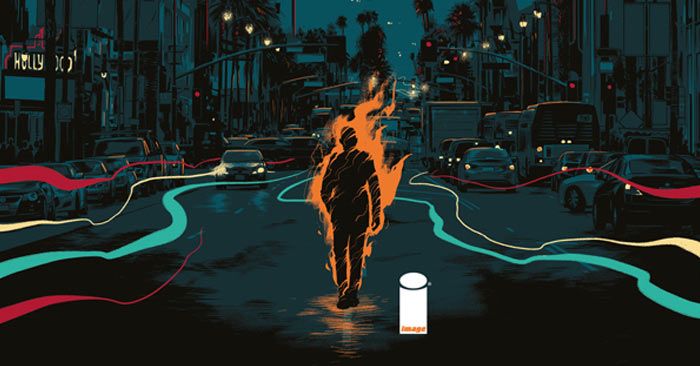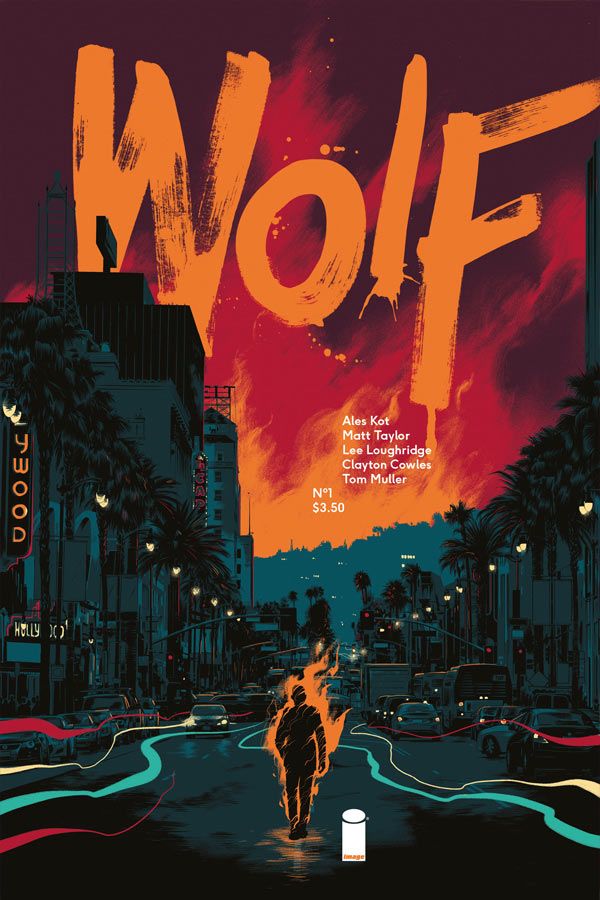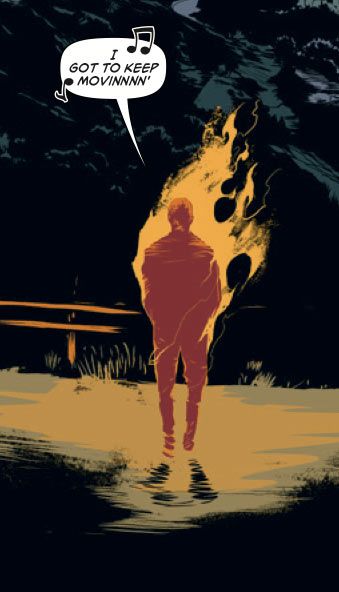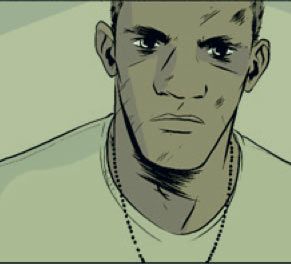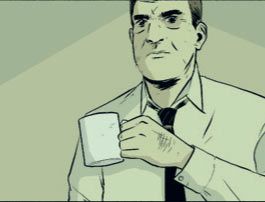At first glance, crime noir tales and stories about magic and the supernatural may not appear to have much in common. On some level though, both types of stories are about fundamental laws and what happens to the people that break, bend and enforce them. The urban fantasy genre, which has exploded in popularity in recent years, merges the noir with horror and dark fantasy for stories where intrepid investigators march down mean and magical streets to investigate the man made and supernatural horrors of a big city.
In prose, Jim Butcher's Harry Dresden is one of urban fantasy's most famous detectives, while DC/Vertigo's John Constantine is perhaps comics' most famous street magician. This July, writer Ales Kot, artist Matt Taylor and colorist Lee Loughridge introduce readers to the medium's newest hardboiled supernatural detective, Antoine Wolfe, in "Wolf."
We spoke with Kot about his interest in urban fantasy, the role the fantastic plays in his latest Image Comics series, setting their comic in Los Angeles, and how he's structuring and plotting out the book's long form story.
CBR News: What I've seen and read of "Wolf" suggests an almost urban fantasy style mash-up of elements from crime and noir fiction and fantasy and horror. Is that a fair description?
Ales Kot: That's a pretty fitting description, yeah. Some of the first authors who deeply impacted me as a child were Neil Gaiman, Clive Barker, Terry Pratchett and Stephen King, and I grew up in an industrial area of the Czech Republic with high pollution, high unemployment and low empathy. Kids I went to school with took a local businessman to the woods and killed him. Dirty business was -- and is, by many -- considered standard business. It's a loud, abrasive, brutal place with beautiful plains and woods. In other words, prime noir environment.
"Wolf" is where these influences meet in a much more defined way than ever before. Nic Pizzolatto, James Ellroy, Joan Didion, David Lynch and my unhinged life in (especially) California would be some of the other influences. And "Ravenous" by the great late Antonia Bird! And the "Women Who Run with the Wolves" by Clarissa Pinkola Estes! And "Preacher!" I could go on and on.
Mashing all of this up -- you know, I don't really analyze it. "Wolf" just came to me as a very formed feeling, a very formed world, in certain aspects. It's like I could smell it, I could trace the contours.
How big a role does the fantastic play in "Wolf?" Are the horror and fantasy elements something that sort of exists in the shadows and only select people know about, or are you more interested in exploring a world where the fantastic is part of everyday life and something the average person has to deal with?
The first -- not many people know, but oh, my, does it all exist. But the thing about the fantastic also, is -- we humans have a stellar track record of calling things "fantastic" and "fantasy" when they're unproven by standardized methods and calling them "real" and "scientific" once they are proven by the very same methods. The middle ground is missing as a study now, and it's one of the very basic studies of the universe -- alchemy, the merging of opposites.
Example: most people don't know how their cell phones actually do most of what they do, and they can't see the sequences of the operations they perform. Does that mean that the phones are magic, or science? Or both?
It's beautiful -- we see about 3% of everything that exists about us, that's just how our perception currently works. What's the 97% we don't see?
Enter the Los Angeles of "Wolf."
How important a role do you think the city will play in your larger story? Is it a backdrop, or do you want Los Angeles to be character in its own right?
Los Angeles drips weird. It sticks and breathes and elucidates on your dreams and nightmares. The line between belief and reality -- if it even exists -- is thin there, and once you enter, you're skating on it. It's a city that's desert and mountains and ocean and hills and woods and all the weird people just let you be weird, because "weird" is not a problem there. All the warehouses with histories. All the highways connecting all the villages. The film history, the history of perversion, the edge of apocalypse in the desert, it's all there for you, breathing, alive. Los Angeles is wilderness masking as a city.
Los Angeles is crucial to "Wolf." So is California as a whole. This is a California story, through and through, although we might travel here and there, with New Orleans and New York being two of the eventual locations I already know about.
The protagonist in "Wolf" is a detective named Antoine Wolfe. How similar and how different is he to classic hardboiled detectives and other paranormal sleuths? What can you tell us about his personality?
I want you to discover him as you go! The first issue is $4.99 for nearly 60 pages, so we cover a lot of ground there, and the richness of the character is astounding to me. It's so wonderful to just dive in and discover. Like diving, I know it might feel scary at first, because you can't tell what's under the surface of "Wolf" unless you approach it, unless you look down, but that's the beauty of it -- you're allowing yourself to be vulnerable, and that's how real communication happens, and art at its best is exactly that -- a real communication between people.
I'll give you a few hints: Raymond Chandler's Marlowe was wearing that WWI coat because he was a war veteran, reading can be underrated, and I'm missing a real street magician in our current culture.
Is "Wolf" a series that you can plot in the same way you do books like "Secret Avengers" and "Material?" Or does its nature require a tight outline?
Well, "Secret Avengers" and "Material" are done with different methods, but the similarity is that I know some parts and don't let not knowing others -- or not seeing them clearly -- stop me from executing scenes and movements exactly the way I feel they should be. I know a decent amount of what happens in "Wolf," but how it happens, and whether it won't change -- I'm leaving that to the sense of discovery within the creative moment.
Even the best tight outline is just a starting point for me. What's the point of making something if it's not an adventure until the end?
Do you see "Wolf" as a series that follows smaller cases and stories, or is it a tale of one epic journey? And can you comment at all on some of the obstacles Antoine might encounter in this series?
First answer: ultimately, one big story.
Second answer: racism, prison-industrial complex, unresolved past, vicious mystical creatures, vicious human creatures, the possible end of California, demons, hell.
Matt Taylor, who you worked with on "Zero," is providing the art for "Wolf." From what I've seen of his work, he seems to be perfect for the acting and emotional tone of crime and noir stories.
I just wanted to work with Matt for a long time. I don't even know why it felt right -- it just did. I suspect it's something about his line, the way he treats lines -- they are deformed, but clear and defined, like waves you can see only halfway, which connects with the core theme of the comic.
And besides that, he just gets comics-making. Matt's playful, effective, cares about what we're doing, he's talented and invested in the vision.
Superstar colorist Lee Loughridge is coloring Matt's art for "Wolf."
What's it like working with Lee? Have you guys collaborated before? And it seems like color and lighting would be an especially important element to a noirish story set in LA.
We never collaborated before, but I've known and loved Lee's work for a long time now. After all, he used to color "Hellblazer" -- and who's better to color the comic that will, for me, replace "Hellblazer?"
The tagline for "Wolf" is "Blood and Magic." The desert, the shadows, the luminosity of Los Angeles as a city and as a natural monument, and on a larger scale the same of California -- Lee gets it.
What sort of hints and teases can you offer up about the first issue? At 60 pages long, I'd imagine a lot happens, but what sets the story in motion?
I feel I already gave you enough hints and teases, so nope, you're gonna have to come and get it!
Okay, okay. There's a man set on fire on the hill overlooking Los Angeles.
"Wolf" #1 is the best first issue I've written since "Material" #1. It's an epic story concerned with myth and character, it builds upon the traditions of California noir and fantasy horror, and if it won't surprise you, I'll be shocked.

